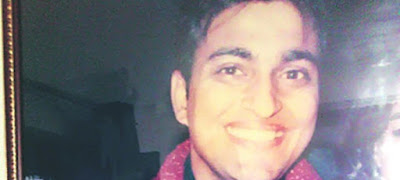Communal Poison
The dangerous falsehoods continued even after police and press reports made it clear that there was no communal angle to the murder.
Scroll Staff
Another day another #outrage on social media. Except, in this case, things were more malevolent than usual.
A 40-year-old dentist was beaten to death in west Delhi’s Vikaspuri area on Wednesday. The incident started when the victim, Pankaj Narang, was involved in a quarrel with two men on a motorcycle. As per an Indian Express report Narang slapped the rider, leading to tempers flaring. Later, the rider returned with a group of nine – consisting of five Hindus and four Muslims as per a Dainik Bhaskar report – and proceeded to assault Narang, leading to his death.
Ignoring or unmindful of these facts, however, users on social media sites such as Twitter started to twist this murder into a communal incident.
On Friday morning Rahul Raj, co-founder of the website OpIndia.com, made Holi the “cause” of the “communal” clash.
He later deleted the above tweet, saying:
But Twitter was already abuzz with the rumour.
This handle has 63,000 followers and is followed by the prime minister, among others.
Even when the Holi motive died down, the rumour that this was a “Hindu-Muslim” clash, a Dadri-in-reverse, persisted.
Tarek Fatah, a Canadian writer who frequently comments on communal relations in India, incorrectly characterised the mixed-faith mob as a “Muslim mob”, going on to graphically describe the violence.
Fatah later on deleted this tweet and posted a correction.
As if the “Muslim mob” rumour wasn’t enough, anonymous but influential Tweeters added “Bangladeshi” to the mix, firing up things even more. A handle calling itself the “Amit Shah Army” with 72,000 followers tweeted this out on Saturday morning:
There was even a call for on-ground mobilisation – lucidly illustrating how seemingly harmless rumour mongering in cyberspace could lead to actual real-world violence.
Matters reached a pass where the Additional Deputy Commissioner of Police of Delhi (West) had to actually tweet out the religious break up of the mob in order to quash rumours.
Bhardwaj’s tweets as well as the many press reports clearing up the matter, though, seems to have had little effect on Twitter as the hashtag #JusticeforDrNarang, filled with communal comments, trended at first place on Saturday afternoon.
While the Indian Twitter community is tiny – the website has 2.2 crore user, amounting to 1.8% of the country’s population – it often generates a disproportionate amount of noise given its elite, English-speaking character. Unfortunate, this isn’t the first time Tweeters have used their social media megaphone to try and spread communal rumours. Here are three earlier such instances:
1. It wasn’t #GodhraAgain. So what exactly happened in Uttar Pradesh?
2. The riot that wasn’t: How Twitter spread rumours of communal violence in Kolkata
3. Kolkata Ground report: Was Durga Pujo really banned in a West Bengal village?
We welcome your comments at letters@scroll.in.
The dangerous falsehoods continued even after police and press reports made it clear that there was no communal angle to the murder.
Scroll Staff
Another day another #outrage on social media. Except, in this case, things were more malevolent than usual.
A 40-year-old dentist was beaten to death in west Delhi’s Vikaspuri area on Wednesday. The incident started when the victim, Pankaj Narang, was involved in a quarrel with two men on a motorcycle. As per an Indian Express report Narang slapped the rider, leading to tempers flaring. Later, the rider returned with a group of nine – consisting of five Hindus and four Muslims as per a Dainik Bhaskar report – and proceeded to assault Narang, leading to his death.
Ignoring or unmindful of these facts, however, users on social media sites such as Twitter started to twist this murder into a communal incident.
On Friday morning Rahul Raj, co-founder of the website OpIndia.com, made Holi the “cause” of the “communal” clash.
He later deleted the above tweet, saying:
But Twitter was already abuzz with the rumour.
This handle has 63,000 followers and is followed by the prime minister, among others.
Even when the Holi motive died down, the rumour that this was a “Hindu-Muslim” clash, a Dadri-in-reverse, persisted.
Tarek Fatah, a Canadian writer who frequently comments on communal relations in India, incorrectly characterised the mixed-faith mob as a “Muslim mob”, going on to graphically describe the violence.
Fatah later on deleted this tweet and posted a correction.
As if the “Muslim mob” rumour wasn’t enough, anonymous but influential Tweeters added “Bangladeshi” to the mix, firing up things even more. A handle calling itself the “Amit Shah Army” with 72,000 followers tweeted this out on Saturday morning:
There was even a call for on-ground mobilisation – lucidly illustrating how seemingly harmless rumour mongering in cyberspace could lead to actual real-world violence.
Matters reached a pass where the Additional Deputy Commissioner of Police of Delhi (West) had to actually tweet out the religious break up of the mob in order to quash rumours.
Bhardwaj’s tweets as well as the many press reports clearing up the matter, though, seems to have had little effect on Twitter as the hashtag #JusticeforDrNarang, filled with communal comments, trended at first place on Saturday afternoon.
While the Indian Twitter community is tiny – the website has 2.2 crore user, amounting to 1.8% of the country’s population – it often generates a disproportionate amount of noise given its elite, English-speaking character. Unfortunate, this isn’t the first time Tweeters have used their social media megaphone to try and spread communal rumours. Here are three earlier such instances:
1. It wasn’t #GodhraAgain. So what exactly happened in Uttar Pradesh?
2. The riot that wasn’t: How Twitter spread rumours of communal violence in Kolkata
3. Kolkata Ground report: Was Durga Pujo really banned in a West Bengal village?
We welcome your comments at letters@scroll.in.
Source: scrollin









